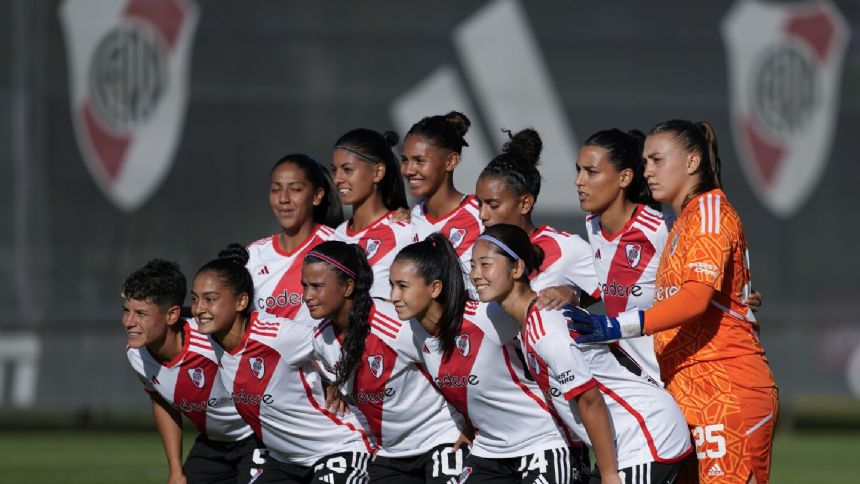- CapperTek
- Sports and Betting News
- Soccer
- Lured by the passion for soccer, growing number of foreign players join Argentina's women's league
Lured by the passion for soccer, growing number of foreign players join Argentina's women's league
Fri, Mar 15, 2024
Soccer News (AP)

BUENOS AIRES (AP) - After watching Lionel Messi lift the World Cup trophy for Argentina, Japanese striker Ichika Egashira packed her bags and took a plane to the other side of the planet to play where her soccer hero was born.
The 21-year-old Egashira didn't speak Spanish or understand much about a South American culture that was totally different from her own. She didn't know much about Argentina's women's soccer league, either. Still, she scored 10 goals last year for her Excursionistas team and was then signed by storied club River Plate for this year's league season.
Egashira is part of a growing group of foreign players joining the Argentine women's league, which recently turned professional and is trying to boost its profile.
They are not coming to Argentina for the money. The South American country has the world's worst inflation numbers, with its 12-month rate through February up 276%, and an unstable exchange rate under new President Javier Milei. Poverty is rising, purchasing power is down, and there is more money to be made in Europe for soccer players.
But they're coming to Argentina for its soccer history and its passionate fans.
"More than anything else I like their passion for soccer, they are crazy. In Japan it is not like that," Egashira told The Associated Press, speaking Spanish with a local accent after taking classes. "I liked Argentine soccer and I am also a big fan of Messi. I wanted to play in Argentina, but I had no idea about women's soccer here."
Argentine clubs currently have 45 foreign female players under contract. They come from Japan, France, United States, Mexico, Colombia, and other nations. Each of the country's 18 teams can sign up to six foreign players and make four of them eligible in every match - one more than in 2023.
Egashira said many of her Japanese compatriots have reached out to her to learn more about Argentina's women's league, which became professional in 2019.
"Here in Argentina (women's) soccer has much more potential. Players are naturals. I love that," she said.
Boca Juniors' women's team recently signed 20-year-old Japanese midfielder Yuria Sasaki, who came from Australia's Essedon Royals. Both Sasaki and Egashira made their debut for their new teams at a River-Boca superclasico on March 10 in the first round of this year's league.
Boca, which lifted the women's title last year, won 2-0.
Sasaki had her first contact with Argentine soccer at a Boca academy in Tokyo.
"I was the only woman, they taught me how to play soccer," she told the AP. "My dream is to win the league and the Copa Libertadores, I am a 100% Boca Juniors fanatic."
Boca's best result in the women's Copa Libertadores, the South American club tournament, was a runner-up finish in 2022. The tournament has been dominated by Brazilian and Colombian clubs.
Two more Japanese footballers play in Argentina: Gimnasia La Plata's Fuko Takahashi and Ferrocarril Oeste's Runa Watanabe. They are paid in highly devalued Argentinian pesos like the other players.
Fernando Moya, an agent for Egashira, Takahashi and Watanabe, said all three see a possibility to develop in Argentina.
"That encourages us to continue bringing more girls," he said. "There is a real interest."
Winger Eponine Howarth is one of the few French women's players who has made the move to a South American team.
Howarth said she has had to get used to people always bringing up Argentina's win over France in the men's World Cup final in Qatar, where Messi's team prevailed after a penalty shootout.
"Every day," said Howarth, who plays for Ferrocarril Oeste. "Today, I heard it in the dressing room."
Known as "Epo," the 27-year-old Howarth said the Argentine league gave her a chance to play professional soccer again after years in retirement. She played for a team in Belgium's first division before she quit to study law and become a social researcher in England.
"At this moment soccer comes first. It was never the case (before). Now I can dedicate 100%," said Howarth, who is also the editor of a culture magazine. "I hope I can help the team with goals and help my teammates off the pitch too, collaborate with the development of women's soccer."
Every team in Argentina's women's league has at least one foreigner, with players from neighboring Uruguay making up the biggest group with 14.
Ferrocarril Oeste coach Franco Bertera said Argentine clubs are actually saving money by signing foreign players.
"It is convenient for the clubs to bring foreign players because they don't come because of wages, they want an apartment and food. An Argentine player might be paid much more," Bertera said.
The coach believes both the foreign and Argentine players are benefiting from the cultural exchange.
"They quickly integrate, they gather to cook something from the other player's country. Argentinians are open to foreigners," he said.
_____
AP photojournalist Natacha Pisarenko contributed to this story.
"